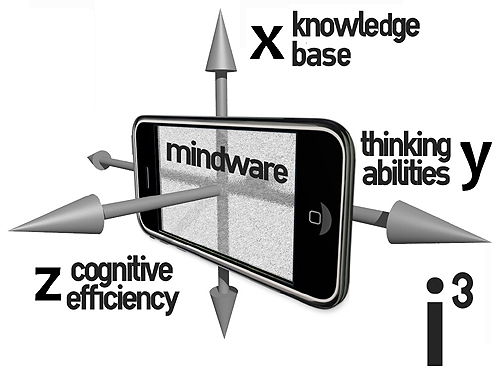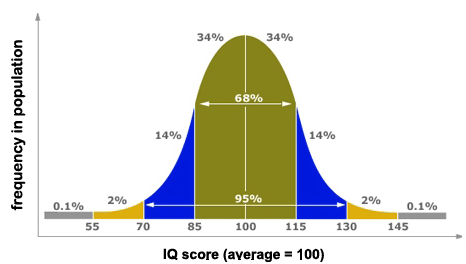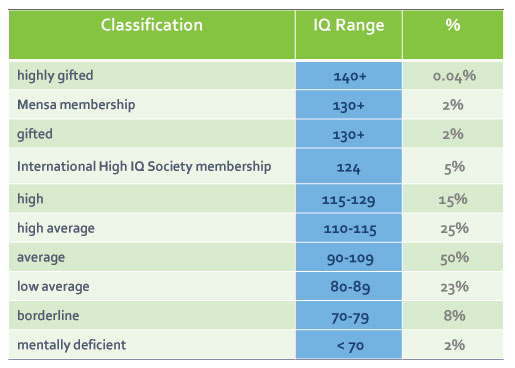SuperSmart has a great (not to be taken too seriously) feature entitled ‘The 30 Smartest People Alive Today‘, where you can find a number of individuals with recorded IQ levels above 160. The World Genius Directory is perhaps the most up-to-date directory of super-IQs, including the 2013 ‘Genius of the Year’ winner for Europe, Dr Evangelos Katsioulis, famous for…
Highest adult IQ in the world (2012): IQ 198 Highest adult IQ in the world (2010 – 2012): IQ 198.. Highest IQ performance, Cerebrals Society International Contest: IQ 178 ± 5 (2009). GIGA Society Member: IQ 196 (2003). Highest IQ performance, Cerebrals Society N-VCPE-R International Contest: IQ 192, 2002 Highest performance in Physics among 11,732 examinees (150/160), Greek National Final Examinations, (1993) 3rd highest performance in mathematics in the city of Thessaloniki, Greek National Mathematical Contest, (1989).
In this article I want to clarify what is meant by being smart as measured by valid, standardized IQ tests.
The way scientists assess intelligence is based entirely on standardized IQ scales within the psychometric tradition. There is a lot of cognitive and emotional skill and performance that is left out by these tests including aspects of executive functioning, intuitive decision-making, creativity, aspects of EQ, cognitive resilience, as well as great skill within specific domains such as music or mathematics.
So what do IQ test aim to capture?
General intelligence (G) – the ‘G’ factor
While people have different cognitive strengths and weaknesses, psychologists have found through psychometric testing that there is a common component called ‘general intelligence’ or ‘G‘. Individuals differ in their ‘G’ factor & valid IQ tests give reliable, internally consistent and standardized measures of those individual differences.
The 3 dimensions of G
In the psychometric tradition, general intelligence (G) can be understood in terms of 3 dimensions measured as 5 underlying factors of G:
(1) our knowledge base – crystallized intelligence (Gc)
(2) our thinking skills – fluid intelligence (Gf), visual-spatial intelligence (Gv)
(3) our cognitive efficiency or ‘brain power’ – processing speed (Gs), working memory/short-term memory (Gwm)

IQ tests
IQ tests are widely used in our society. Universities use IQ tests to select students, companies use IQ tests (job aptitude tests) to screen applicants, and high IQ societies such as Mensa use IQ test scores as membership criteria. IQ scores have a distribution that looks like a bell curve.

IQ tests are designed so that the average IQ score is 100. In this graph, you can see that 68% of the population has an IQ score between 85 and 115 (1 standard deviation on either side of the average score). Around 2% of the population has an IQ greater than 130 (2 standard deviations above the average score) which is a ‘very superior’ intelligence or ‘gifted’ intelligence. This is the IQ needed to become a member of Mensa. An IQ of 115 or more is considered a high IQ. Here is a table for what IQ scores mean:

5 Factors of G
As we said, the three basic dimensions of general intelligence (G) – knowledge base, thinking skills & cognitive efficiency – are made up of 5 factors that can be measured by different sub-scales of full-scale IQ tests. Let’s look at each of these in turn.
Fluid intelligence (Gf)
Our fluid intelligence (Gf) is our reasoning, problem solving and learning ability in new situations. It is often used as a test for general intelligence in itself. All the scientific studies looking at the effectiveness of dual n-back training on raising intelligence, defined general intelligence simply as fluid intelligence. Scientifically developed brain training apps such as i3 Mindware increase fluid intelligence levels by an estimated 10-20 points.
Technical definition of fluid intelligence (Gf)
Fluid intelligence (Gf) refers to the ability to reason and to solve new problems independently of previously acquired knowledge. …it allows us to adapt our thinking to a new cognitive problem or situation. Gf is critical for a wide variety of cognitive tasks, and it is considered one of the most important factors in learning. Susanne Jaeggi . Fluid intelligence is used for:
-
problem solving
-
making inferences
-
deductive and inductive reasoning
-
concept formation and classification
-
generating and testing hypotheses
-
seeing relations and patterns
Tests of Gf
Deductive reasoning, inductive reasoning (Matrices tests, such as Raven’s Advance Progressive Matrices), quantitative reasoning, and speed of reasoning.The IQ Mindware Test Battery that comes with IQ Mindware brain training products provides pre and post-training measures of fluid intelligence.
Crystallized intelligence (Gc)
Crystallized intelligence can be thought of as our knowledge bank – the product of what we invest our fluid intelligence into learning and knowing about. It is our crystallized knowledge – not our fluid reasoning and analysis. It is what we know and our skill-sets, and includes our general knowledge. Gc training is provided by the problem solving exercises that work in combination with working memory training in the desktop app i3 Mindware. Gc can also be trained using mobile apps such as Brilliant.
Technical definition of crystallized intelligence (Gc)
Tests of crystallized intelligence
Visual spatial intelligence / Visual processing (Gv)
Our visual spatial intelligence (Gv) is our the ability to manipulate mental visual images to solve problems. This is the kind of intelligence needed by 3D designers. It’s a type of intelligence that can be trained particularly well with AMP x-training.
Technical definition of visual spatial intelligence (Gv)
Tests of visual spatial intelligence
Processing speed (Gs)
Processing Speed is one of the measures of cognitive efficiency. It involves the ability to automatically and fluently perform relatively easy or over-learned cognitive tasks, especially when high mental efficiency is required.
Definition of Processing Speed (Gs)
Tests of Processing Speed
Short Term Memory / Working Memory (Gsm)
Short term memory and working memory are both aspects of a short term information storage systems for integrating and processing the information that is attended to while thinking, problem solving, comprehending and decision-making. Working memory training is the basis of the most well-researched and scientifically credible brain training for longer-term IQ gains. Working memory training is the basis of the dual n-back.
Technical definition of Gwm
Tests of Short Term Memory / Working Memory
We can also now understand how being good at math can be made up of certain IQ factors –
Quantitative intelligence (Gq)
Quantitative intelligence is our store mathematical knowledge and quantitative reasoning ability.
Technical definition of quantitative intelligence (Gq)
The most effective app we have developed at IQ Mindware for increasing the 5 factors of IQ is i3 Mindware.
The 2G dual n-back task trains cognitive efficiency (Gwm and Gs) as well as thinking skills (Gf and Gv) while the exercises train knowledge and skills (Gc).


